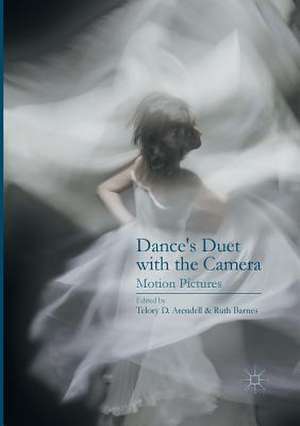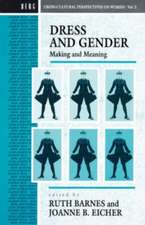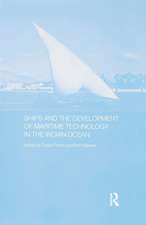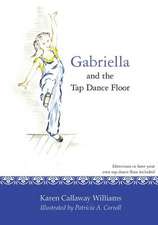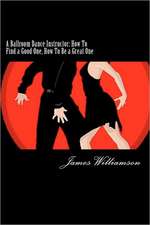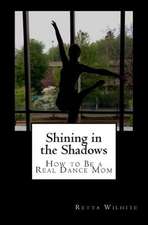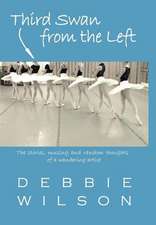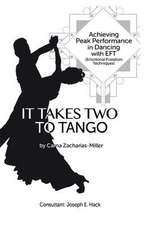Dance’s Duet with the Camera: Motion Pictures
Editat de Telory D. Arendell, Ruth Barnesen Limba Engleză Paperback – 6 iun 2018
| Toate formatele și edițiile | Preț | Express |
|---|---|---|
| Paperback (1) | 694.04 lei 6-8 săpt. | |
| Palgrave Macmillan UK – 6 iun 2018 | 694.04 lei 6-8 săpt. | |
| Hardback (1) | 698.94 lei 6-8 săpt. | |
| Palgrave Macmillan UK – 4 iul 2016 | 698.94 lei 6-8 săpt. |
Preț: 694.04 lei
Preț vechi: 816.51 lei
-15% Nou
Puncte Express: 1041
Preț estimativ în valută:
132.85€ • 144.35$ • 111.66£
132.85€ • 144.35$ • 111.66£
Carte tipărită la comandă
Livrare economică 21 aprilie-05 mai
Preluare comenzi: 021 569.72.76
Specificații
ISBN-13: 9781349955510
ISBN-10: 1349955515
Pagini: 263
Ilustrații: XVII, 263 p. 1 illus.
Dimensiuni: 148 x 210 mm
Greutate: 0.34 kg
Ediția:Softcover reprint of the original 1st ed. 2016
Editura: Palgrave Macmillan UK
Colecția Palgrave Macmillan
Locul publicării:London, United Kingdom
ISBN-10: 1349955515
Pagini: 263
Ilustrații: XVII, 263 p. 1 illus.
Dimensiuni: 148 x 210 mm
Greutate: 0.34 kg
Ediția:Softcover reprint of the original 1st ed. 2016
Editura: Palgrave Macmillan UK
Colecția Palgrave Macmillan
Locul publicării:London, United Kingdom
Cuprins
Chapter 1. Introduction; Telory D. Arendell.- Part I. Site/Sight and the Body.- Chapter 2. Location, Location, Location; Melanie Kloetzel.- Chapter 3. The Feminist Body Reimagined in Two Dimensions; Cara Hagan.- Chapter 4. Hollywood Cinematic Excess; Frances Hubbard.- Part II. Movement Beyond the I/Eye.- Chapter 5. Loïe Fuller and the Poetics of Light, Colour, and Rhythm; Izabella Pruska-Oldenhof.- Chapter 6. Naked Came I/Eye; Peter Sparling.- Part III. Querying Praxis.- Chapter 7. Theoretical Duet; Telory D. Arendell and Ruth Barnes.- Chapter 8. Wrestling the Beast… and Not Getting Too Much Blood on Your Skirt; Heather Coker.- Chapter 9. Turning Around the Gaze in the Age of Technological Proliferation; Ruth Barnes.- Part IV. Bodies, Spaces, Camera.- Chapter 10. Videodance; Angela Kassel.- Chapter 11. Maya Deren; Telory D. Arendell.- Chapter 12. Valentine for Dance Historians; Carol-Lynne Moore.- Part V. New Technologies.- Chapter 13. Moving In(To) 3D; Philip Szporer and Marlene Millar.- Chapter 14. Conclusion; Ruth Barnes.
Notă biografică
Telory Arendell is Assistant Professor of Performance Studies at Missouri State University, USA. Her books include Performing Disability: Staging the Actual (2009) and The Autistic Stage: How Cognitive Disability Changed 20th-Century Performance (2015).
Ruth Barnes is a choreographer, performer and dance educator. She is a professor and Dance Program Coordinator at Missouri State University, USA.
Ruth Barnes is a choreographer, performer and dance educator. She is a professor and Dance Program Coordinator at Missouri State University, USA.
Textul de pe ultima copertă
Dance’s Duet with the Camera: Motion Pictures is a collection of essays written by various authors on the relationship between live dance and film. Chapters cover a range of topics that explore dance film, contemporary dance with film on stage, dance as an ideal medium to be captured by 3D images and videodance as kin to site-specific choreography. This book explores the ways in which early practitioners such as Loïe Fuller and Maya Deren began a conversation between media that has continued to evolve and yet still retains certain unanswered questions. Methodology for this conversation includes dance historical approaches as well as mechanical considerations. The camera is a partner, a disembodied portion of self that looks in order to reflect on, to mirror, or to presage movement. This conversation includes issues of sexuality, race, and mixed ability. Bodies and lenses share equal billing.
